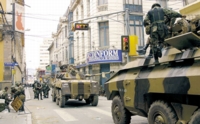Goni's dilemma
02.14.2003 The situation in Bolivia is only slowly returning to normal (NYTimes, BBC). Yesterday, another 10 dead and 64 wounded in looting and confrontation against the military.
The situation in Bolivia is only slowly returning to normal (NYTimes, BBC). Yesterday, another 10 dead and 64 wounded in looting and confrontation against the military.
Tanks and armored vehicles dominate the once-peaceful Plaza Murillo. I remember strolling in the sunlight, feeding pigeons, listening to the kaleidoscope sound of children and street venders and taxis. Now it's a militarized zone.
I heard from my relatives in La Paz; they're all safe, though still worried. The total absence of police in the city for two days led to opportunistic looting and vandalism. Neighborhoods organized defensive barricades.
Some opposition leaders are taking advantage, calling for the president's resignation. Goni (the president's nickname) gave a press conference, making it clear he won't step down. I don't think he should; not w/o new elections. What sucks is that Goni is doing a pretty job as president. But the cocaleros and disgruntled Trotskyite vanguard are masters at mobilizing militant protests.
Here's a list of Bolivian online newspapers: La Razón, El Diario, Los Tiempos, El Deber, Bolivia Hoy, Correo del Sur, La Prensa
Posted by Miguel at 02:23 PM
Comments
It's even more absurd that the police officers started all this. They are supposed to be the keepers of peace!!!
Are there protests (held on smaller scales) often in Bolivia?
There're a few things in the BBC article that were surprising:
-The BBC article wrote abt a nurse being shot by a sniper. Why were there snipers? And, why did a sniper aim for a nurse?
-The article also mentioned half the police force(10,000 officers) refused to work. 20,000 officers in a population of abt 8 million is not so many.
Hope your relatives and friends there stay safe!
There's little to do except to weather the storm until it passes.
Posted by: lippy lin at February 15, 2003 10:02 AM
Yes, there are frequent protests in Bolivia (especially the capital). I think protests are good, and they're usually peaceful and just a way to show support/opposition to a proposed policy, or to make demands that the government do something. This one just got way out of hand.
About the snipers ... the Bolivian papers I read mentioned that no one knew who the snipers where. It's possible the snipers were either protesters or army soldier. A problem however, comes down to translation.
In spanish, the Bolivian papers called these shooters francotiradores (or "sharpshooters"). This doesn't necessarily mean "sniper" (at least not in the context of a highly trained accurate rifleman). It means someone shooting independently from a high, concealed position.
And yes, 20,000 police in a country of almost 8 million is low. And when half of them refused to work, that was really bad. Almost all of those were in the capital, so the capital city had no police for days.
Posted by: Miguel at February 15, 2003 01:53 PM
Ahh... ok. I was curious why an elite shooter aimed for someone without a weapon.
Posted by: lippy lin at February 16, 2003 07:55 AM